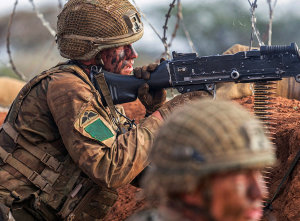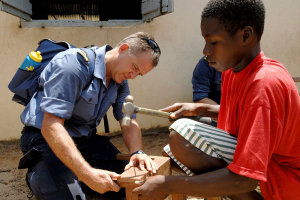The task of building schools and providing education to populations across the world has long been shouldered by civilian aid agencies and foreign diplomacy offices. Yet, how a society is educated is an issue that affects military operations and determines where soldiers are forced to fight next.
Education is a sector of governance that holds a uniquely strong hand over the future prospects of a civilization. If the military continues to cede this role of government to civilians, the national security considerations and goals of western armed forces will not be advanced. Take for example, objectives from the national defense strategies of the US which seek to compete against China’s “increasingly aggressive endeavor to refashion the Indo-Pacific region and the international system to suit its interests and authoritarian preferences”. Or the UK’s objective, “to understand, shape and influence the global landscape to the UK’s advantage.” Civilian aid and diplomatic efforts are ill-suited to take into account these kinds of national defense objectives and would be incapable of pursuing them otherwise. Thus, leaving a void for adversaries and competitors to influence the next generations of young people around the world in ways against the security interests of western militaries.
In the last few years, we have seen western countries slowly start to wake up to the reality of a new great power competition. Recently, the US House of Representatives voted on an overwhelmingly bipartisan basis to set up a select committee on the strategic competition between the United States and the Chinese Communist Party (CCP). Chairman of the committee, Republican Mike Gallagher, noted that, “It is time to understand the urgency of the threat.. to identify long-overdue, commonsense approaches to counter CCP aggression.”
Countering the CCP in spreading influence through education will not be done by the organizations of the United Nations or other humanitarian aid agencies, who often themselves are influenced by the CCP. Instead, it will require military forces taking up education issues to ensure that young minds are not weaponised against us.
Understanding the Challenge
This “CCP aggression” is not a purely military threat. It can come in technological, economic, cultural, and diplomatic forms, seen most notably in the Chinese Communist Party’s Belt and Road Initiative. One often underlooked, yet formative and highly influential sector of government the CCP has invested in to further its soft power is education. For any society, education is the starting point for growth, opportunity, and peace. However, education can also be used to weaponize and leverage influence in foreign countries important to the national security interests of western liberal democracies like the US and UK.
Revisionist powers have certainly prioritized education and no one has taken this to more dramatic measures than the Chinese Communist Party (CCP). In their 2016 Education Action Plan for China’s Belt and Road Initiative, the Ministry of Education of the People’s Republic of China committed to “shoulder as many responsibilities and honour as many commitments as possible, and to make a greater contribution to the development of education” in their cooperating countries.
One continent in which China has placed particular strategic importance is Africa, the first place where Chinese Foreign Ministers have visited for the past 33 years. A vast and growing continent, both in terms of natural resources, human population, and economic opportunity, Africa represents the next battlefield for what Britain’s Foreign Secretary, James Cleverly, calls the “global competition of ideas.” The education of this burgeoning continent will have significant consequences far beyond its borders, yet the US and Europe have diminished their role in influencing these future generations of Africans. According to the 2022 African Youth Survey, young Africans listed China as having the most influence on the continent while the United States (2nd) and European Union (4th) trailed behind.

For decades, China has been investing in Africa’s education system by building schools, teaching Mandarin, offering vocational training, investing in and partnering with higher education institutes, and creating a pipeline of foreign exchange students. China’s use of soft power through education has grave implications. In the US, we have recognized these implications and have banned Confucius Institutes, which have been used by China’s Ministry of Education to teach Mandarin worldwide, but under closer look have shown to be used for more nefarious purposes. Under CCP supervision, politically sensitive topics are censored in universities, foreign textbooks are banned in schools, and history lessons are revised. Further, one African educator warns that future generations of Africans, “will look to China rather than Europe and America for intellectual inspiration, leadership, and models of social and economic development.”
In discussing UK-Africa relations, James Cleverly, recently highlighted the importance of having a “willingness to sell our ideas and why the values that underpin our democracy are the values of our partners as well.” Western countries who value democratic norms, fundamental liberties, and international rules of law and order, must compete and sell these ideas in the educational institutions in Africa and the world where China’s authoritarian model of governance is currently winning influence.
The Role of Defence
This will require a large-scale effort not only from diplomats and development agencies, but also from defence forces. Many of the past, current, and future battles that defence forces fight can and will be traced back to issues involving how young people are educated. In Africa, the areas with the highest rates of illiteracy and uneducated citizens suffer from the greatest conflict and violence. In the Middle East, education institutions have been and continue to be used as training grounds for terrorist organizations. Education can and has been a form of weaponry. If we let our adversaries such as China dominate in this critical sphere of influence, young hearts and minds around the world will be taught and instructed in ways antithetical to our interests and values. This is why it is imperative for militaries to include education in their military operations.
Currently, UK Armed Forces in Africa are engaging in operations involving “terrorism, the illegal wildlife trade, violations of human rights and emerging humanitarian crises.” So why not education? While western governments have development experts working on education issues abroad, armed forces have unique sets of skills and capabilities that can better enhance western objectives in this space. Armed forces, with the resources and power of their military, are able to operate in more hazardous environments. Additionally, armed forces often find themselves in what we call the “gray zone” which has been described as the “the contested arena somewhere between routine statecraft and open warfare.” Much of the current great power competition occurs in this gray zone and well-trained military forces can provide more effective on-the-ground support and can collaborate with necessary agencies when needed. Rather than posing local populations with the difficult and time-consuming task of navigating lengthy and sometimes corrupt bureaucratic civilian organizations, a military force could provide instant access to a full range of government services such as education.
Military forces well-trained in engaging in education operations won’t happen by the stroke of a pen. In planning for military training, exercises, and operations, educational needs and scenarios involving schools should be included. Soldiers and commanders should be equipped with the tools and knowledge to successfully implement educational solutions for a country or village that surpass the alternative solutions provided by our competitors. How can the UK military be properly trained to do so?

In the US, we have taken major steps towards providing our military with expertise beyond the battlefield in areas of governance such as education through our Civil Affairs Military Government Specialists. These Army Reserve officers specialize in a variety of fields critical to the rebuilding and governing of a society such as commerce and trade, energy, or transportation, just to name a few. With this capability we are able use our field expertise and civilian partnerships to provide our defense forces with recommendations and considerations on issues like education. Further, using our subject matter expertise on issues of governance and infrastructure, we can be used by a foreign country or village as an alternative to civilian organizations or our adversaries.
While this level of expertise and training may not be immediately available in military ranks, armed forces can collaborate with universities. Academic professionals with years of background and experience can fill these knowledge voids by providing recommendations and counsel on military training exercises and operations. For example, in UK education circles, Buckingham University Vice Chancellor James Tooley has decades of experience researching and building successful schools in some of the most volatile areas of the world. This type of subject matter expertise would be invaluable to troops engaging in operations involving education worldwide.
While visiting Africa last week on a visit to unveil Africa’s new China-aided CDC headquarters, China’s newly appointed Foreign Minister Qin Gang, said that Africa should not be, “an arena for major countries’ competition.” This statement, contrary to the actions of the CCP, couldn’t be further from the global competition reality great powers find themselves in today. We are in a war of ideas and competition with the CCP who believes in, and wants to export the authoritarian actions recently taken at the Chinese Embassy in Manchester where pro-democracy protestors were bullied and beaten. It is our job to stand in the way of and offer a better alternative through educating people on the difference between the West and China, between right and wrong.
*Parts of this article were adapted from Ryan Hooper’s, “Great Power Competition Begins in the Classroom,” published by the Civil Affairs Association. https://www.civilaffairsassoc.org/post/great-power-competition-begins-in-the-classroom
Disclaimer: The opinions, conclusions, and recommendations expressed or implied above are those of the authors and do not reflect the views of any organization or any entity of the U.S. Government.
Cover photo: Credit UK MOD.

Ryan Hooper
Captain Ryan Hooper serves in the US Army Reserves as a 38G Military Government Specialist with a 6D (Education) skill identifier. He is a teacher in Philadelphia, PA, and has written on education issues in nationally publicized outlets. The opinions, conclusions, and recommendations expressed or implied above are those of the authors and do not reflect the views of any organization or any entity of the U.S. government.

